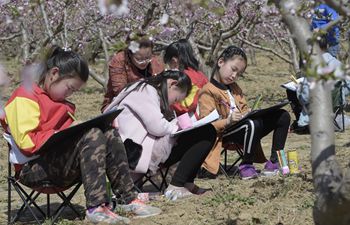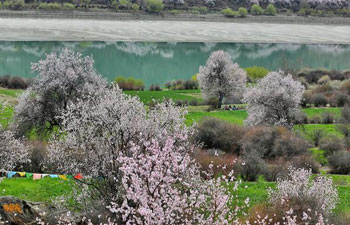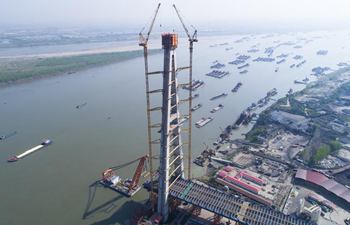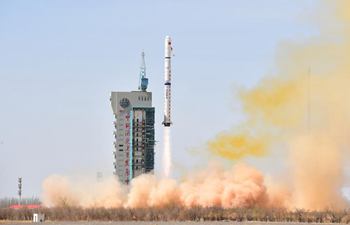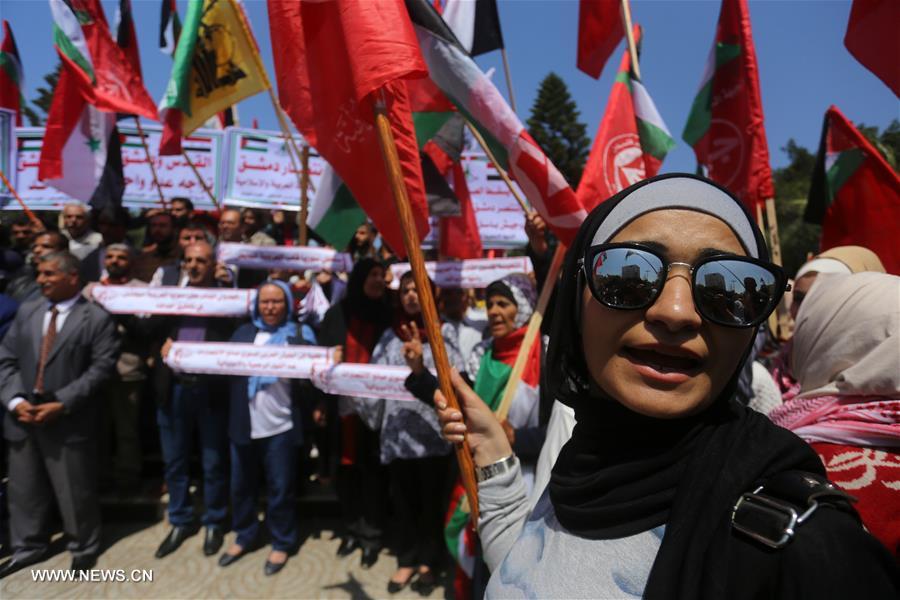
Palestinians take part in a protest following a wave of U.S., British and French military strikes on Syria, in Gaza city, on April 14, 2018. The U.S.-led military attack on Syria could further destabilize Syria and the Middle East at large by heightening the tensions there, experts said. (Xinhua/Yasser Qudih)
by Xinhua writer Zhi Linfei
CAIRO, April 15 (Xinhua) -- The U.S.-led military attack on Syria could further destabilize Syria and the Middle East at large by heightening the tensions there, experts said.
Without the United Nations authorization, the U.S.-led aggression against Syria has been widely criticized for violating the territorial integrity of a sovereign nation by resorting to the use of force based on unverified claims.
Observers expressed concerns that such a move will only destabilize the region and serve the terrorists who could take advantage of it to justify their cause.
UNAUTHORIZED ATTACK
The United States, along with Britain and France, launched joint airstrikes on military targets in Syria on Saturday for its alleged use of chemical weapons early this month.
The allegations, strongly denied by Syria and Russia, have not been independently investigated and verified.
"I think the American attack on Syria is an unjust aggression, and does not comply with the international law and consensus," Ahmed Rafiq Awad, a professor of political science at Birzeit University in the West Bank, Palestine, told Xinhua in an interview.
Awad noted that the United States launched attacks against other countries in the region without authorization from the U.N. in the past, for example, the invasion of Iraq in 2003.
Cahit Armagan Dilek, head of the Ankara-based 21st Century Turkey Institute, said that there is no international legal base for the U.S.-led attack on Syria.
"It's against international law. This kind of unauthorized actions will open door for further illegal operations. So it's not a justified attack," Dilek said.
U.S. MOTIVES
By launching attacks on Syria, experts said, Washington and its allies intended to send out a message that they are not willing to be sidelined on the final settlement of the seven-year old Syrian crisis.
Russia, Iran and Turkey have met several times on settling the Syrian crisis under the Astana process, without participation of the United States.
Sarit Zehavi, chief executive officer and founder of Alma Research and Education Center in Israel, said that one of the messages sent out by the United States to Syria, Russia, Iran and all the others is that they are "not immune from the U.S. involvement in the Middle East."
If followed by a consistent policy, the U.S.-led attack will show to the world that Washington "is back in town, back in business," she added.
Professor Awad said that the Western powers want to be partners in settling the Syrian crisis, especially after the Syrian government's recent victory in liberating Eastern Ghouta.
Supported by Russia and Iran, the Syrian government has been making steady gains in fighting the Western-backed rebels, and has controlled almost 80 percent of the country.
"That's why the West hits Syria. They want to say that they want to play a part in the next settlement (of the Syrian crisis)," Awad said.
CONSEQUENCES
The U.S.-led attack on Syria will have grave consequences, not only in Syria, but the whole Middle East by heightening the tensions, experts said.
Awad said that such a move will further aggravate the tensions, hostility and confrontation in Syria and the rest of the region.
It could intensify the U.S.-Russia rivalry for influence in Syria, though Moscow is unlikely to give a strong military response.
"I believe neither Russia nor Iran wants to escalate the situation. If anything, we will probably just hear some more rhetoric," said Imad Salamay, director of the Institute for Social Justice and Conflict Resolution at the Lebanese American University.
He added that the U.S.-led attack "wouldn't change the situation in Syria."
Initial information showed that no Russians were injured in the U.S.-led attack, Dilek noted, "so I don't expect a strong response (from Russia)."
Togrul Ismayil, a Turkish expert on foreign relations and Russian affairs, said that he did not believe that "Moscow will retaliate militarily to the coalition's air raids."
However, observers are concerned about the attack's impact on the anti-terrorism war as militant groups could take advantage of power struggle.
Ahmad Ban, a researcher with the Cairo-based Nile Center for Strategic Studies, said that the attack will further complicate the region and "would unfortunately bring back terrorist groups such as the Islamic State to the surface" again as "the strikes will stir more conflicts."
(Xinhua bureaus in Damascus, Ankara, Istanbul, Jerusalem, Tehran, Beirut and Ramallah also contributed to the story.)




